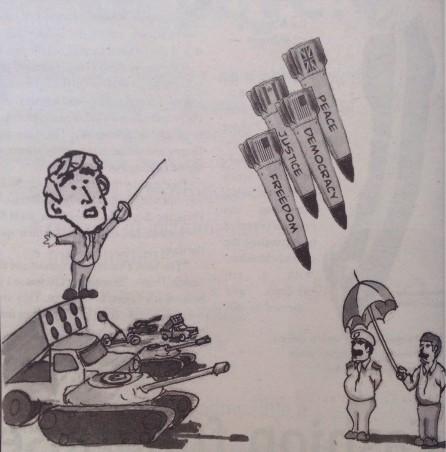By Claudia De Simone
“…Yer warship you worship, Yer worship yer warship, Yer warship yer worship, Yuh worship a warship, yuh worship a warship …” Toronto writer and performer Paul Dutton belts out — almost out of breath — the chanting climax of his poem, “Eighth Sea,” at an anti-war poetry reading last week at a restaurant in the Annex.
The readings were an opportunity for a group of Toronto writers, Writers Against the War, to give a different perspective than what the media and politicians are offering on the looming war on Iraq.
An audience of more than a hundred people gathered in the Plaza Flamingo Restaurant on College Street W. for a reading called Words Over War, an event to commemorate March 5 as International Day of Poetry Against the War.
“If people have come here they have some notion of what’s happening and we’re hopeful we can look at what [the possibility of a war] means for an individual,” says Toronto writer Maggie Helwig.
John Oughton, a literary journalist and professor of literature at Centennial College, read his poetry and hoped the gathering would change how people think about the media messages they consume.
He says the reading may make a subtle difference, “if we can persuade people that issues are not as simple as George W. says and that the lives of people are more important than what the politicians and generals think.”
Oughton, who lived in Iraq for more than a year as a teenager, says that creative writing is a way to establish a personal connection with what’s going on in the world — a way of synthesizing what’s going on in the outside world with a person’s emotions.
“People are so poor in Iraq,” he says. “People became blind because they had no medicine for their eyes and many lived in mud huts. We take things for granted here and don’t know these things until we travel,” he says.
Like Oughton, writer Helwig believes the mainstream media oversimplify the issues surrounding the looming war on Iraq. She’s been involved in politics all her adult life and says that she can detect when the news smells bad.
“I have my own bullshit meter and know about the language the media and politicians use,” she says. “It’s a complicated situation.”
Helwig says that WAW “is a sort of peace activism that’s thoughtful.”
She says that these poets write about the struggles of people and this, on a larger scale, engages with politics. But she says it’s not political poetry. “Saying it’s political poetry is oversimplifying it,” she says.
“Writers have a power that we have to take seriously,” says Helwig. The writers, artists and playwrights who shared their words had their unique reasons for being against the war.
Acclaimed author Camilla Gibb lived in the Middle East and North Africa and says she feels manipulated by the mainstream media. She feels it is important to weigh each word carefully. “We pick apart a word and think of what’s compacted in there,” she says. “Politicians and journalists use a short hand that’s open to interpretation.”
WAW is a Web-based collective of people that welcomes anyone, “as long as you call yourself a writer,” says Helwig, who initiated the Toronto chapter of the group early this year, after an e-mail she read about the group forming in Vancouver at the behest of author John Gilmore. The list of writers on the group’s roster grew after Laura Bush cancelled a major literary symposium at the White House after she got word that anti-war writing would be read there.
In response, poets across the continent put together anti-war poetry anthologies and held peace readings and letter-writing campaigns to international governments. About 20 writers with WAW marched on February 15, where peace rallies were held around the world.
Host and writer Margaret Christakos says that with poetry, there is more ambiguity than straight-fact news. She describes the medium as having a “soft edge but also a power.”
Christakos organized the night in a week and says similar events are on the agenda in the near future. Despite the short notice, the event was taped for CBC radio and CIUT 89.5 HM and filmed for CBC Newsworld so audiences elsewhere can experience Words Over War, she says.
“The notion that writers are participating in what is truly a mainstream protest at this particular moment adds to the current advocacy for a more sentient and humane politic.”










Leave a Reply